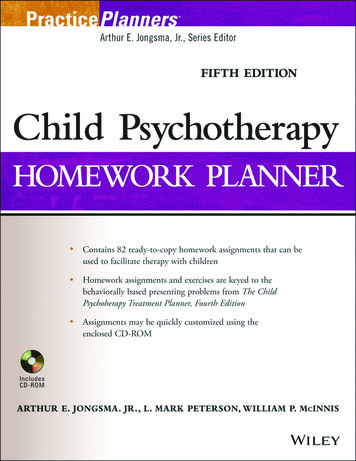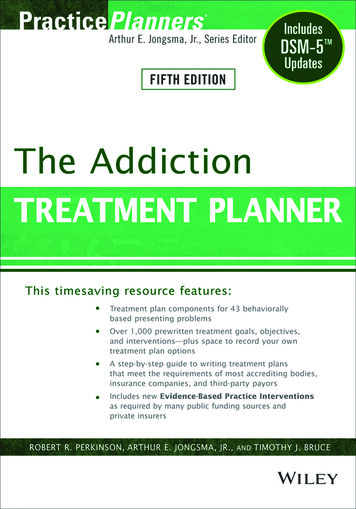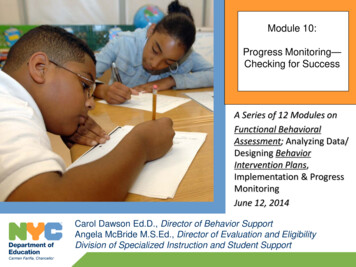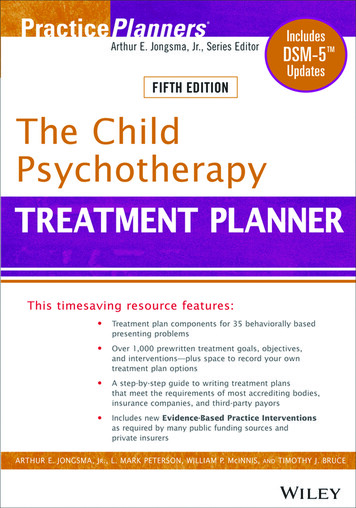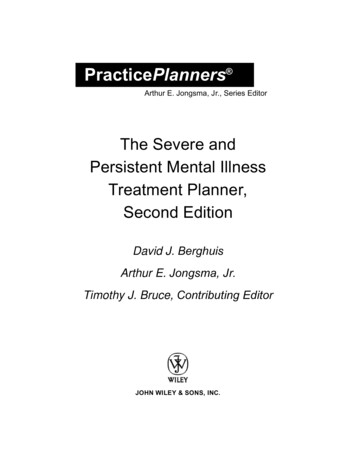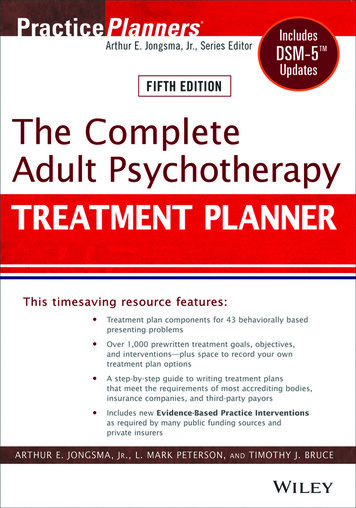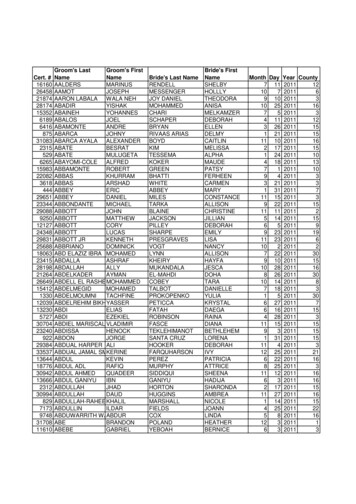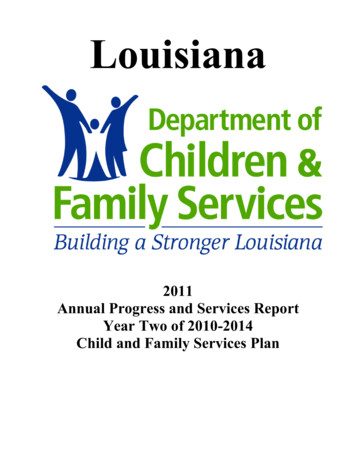
Transcription
Louisiana2011Annual Progress and Services ReportYear Two of 2010-2014Child and Family Services Plan
STATE OF LOUISIANA2011 Annual Progress and Services ReportTable of ContentsSECTION 1: INTRODUCTIONTO DEPARTMENT OF CHILDREN AND FAMILY SERVICES. 1ADMINISTRATION OF PROGRAMS . 3MISSION/VALUES. 3ORGANIZATIONAL CHARTS. 4DISASTER PLANS . 11DECISION MAKING PROCESS. 15CHILD WELFARE DEMONSTRATION WAIVERS . 15COLLABORATION:. 16COORDINATION WITH TRIBES . 20CHILD AND FAMILY SERVICES REVIEW/PROGRAM IMPROVEMENT PLAN:. 26TITLE IV-E REVIEW. 28EVALUATION . 29TECHNICAL ASSISTANCE PLANS:. 30INFORMATION MANAGEMENT . 47QUALITY ASSURANCE SYSTEMS. 50SECTION 2: CHILD WELFARE SERVICES. 54STEPHANIE TUBBS JONES CHILD WELFARE SERVICES PROGRAMTITLE IV-B, SUBPART 1 . 54CHILD PROTECTIVE SERVICES. 55PREVENTION AND FAMILY SERVICES . 61FOSTER CARE/HOME DEVELOPMENT . 65HEALTH CARE OVERSIGHT AND COORDINATION PLAN . 69FOSTERING CONNECTIONS TO SUCCESS AND INCREASING ADOPTIONS ACT: . 76MONTHLY CASEWORKER VISITS:. 79MONTHLY CASEWORKER VISITSDATA (STATISTICAL AND SUPPORTING INFORMATION) . 80JUVENILE JUSTICE TRANSFERS. 83STATEWIDE RECURITMENT/RETENTION PLAN . 84RESIDENTIAL TREATMENT SERVICES . 89INTERSTATE COMPACT ON THE PLACEMENT OF CHILDREN: . 90ADOPTION. 92ADOPTION INCENTIVE PAYMENTS. 103INTER COUNTRY ADOPTIONS. 103CHAFEE FOSTER CARE INDEPENDENCEEDUCATION AND TRAINING VOUCHER PROGRAMS APPLICATION FFY 2012 . 108PROMOTING SAFE AND STABLE FAMILIES TITLE IV-B, SUBPART II: . 136SECTION 3: GOALS FOR 2011 THROUGH 2014 . 206
STATE OF LOUISIANA2011 Annual Progress and Services ReportTHEME 1: RESOURCES. 207THEME 2: OUTCOMES. 227THEME 3: ACCOUNTABILITY . 259THEME 4: PARTNERSHIPS . 265SECTION 4: BUDGET INFORMATION. 279FFY 2012 - CFS 101, PART I . .FFY 2012 - CFS 101, PART II.FFY 2012, CFS 101, PART III .FFY 2011 - REVISED CFS 101, PART I.FFY 2009 CFS 101, PART III .SECTION 5: ASSURANCES . 287
Transmittal Date June 30, 2011Page 1
STATE OF LOUISIANA2011 Annual Progress and Services ReportTransmittal Date June 30, 2011Page 2
STATE OF LOUISIANA2011 Annual Progress and Services ReportSECTION 1: INTRODUCTION TO DEPARTMENT OF CHILDREN AND FAMILYSERVICES: During the 2010 Legislative session, the Louisiana Legislature passed Senate Bill257, a measure that reorganized the Department of Social Services into one agency andrestructured appointees and their responsibilities. On July 1, 2010, the Department of SocialServices officially changed its name to the Department of Children and Family Services (DCFS).The name change also brings structural changes to the Department while the Offices ofCommunity Services, Family Support and Management and Finance no longer exist. In theirplace, there are divisions, sections, units and bureaus, along with parish and regional offices.The DCFS is the state agency designated in Louisiana to administer and supervise theadministration of child welfare services delivered under Stephanie Tubbs Jones Child WelfareServices Program (Title IV-B subpart 1), Promoting Safe and Stable Families (Title IV-B subpart2), and Title IV-E of the Social Security Act. In addition, the Department is designated toadminister the Chafee Foster Care Independence Program and the Child Abuse Prevention andTreatment Act (P.L. 104-235).DCFS administers the state’s child and family services programs and provides comprehensivesocial services and child welfare programs that include protective services, protective childcare,family services, child abuse/neglect prevention, intervention and treatment, foster care andadoption. These services are administered statewide within the organizational framework.This report updates, profiles and summarizes the progress and achievements made by DCFS inits implementation of year two of the 2010-2014 Child and Family Services Plan (CFSP).ADMINISTRATION OF PROGRAMS: The state’s child and family services programs areadministered through the Department of Children and Family Services. DCFS providescomprehensive social services and child welfare programs that include protective services,protective child care, family services, foster care and adoption. These services are administeredstatewide within a centralized organizational framework with 9 regional offices and 46 parishoffices. Services continue to be available in all 64 parishes.MISSION/VALUES: The DCFS is working to keep children safe, helping individuals andfamilies become self-sufficient, and providing safe refuge during disasters. DCFS provides forthe public child welfare functions of the state, including, but not limited to, prevention serviceswhich promote, facilitate, and support activities to prevent child abuse and neglect; childprotective services; voluntary family strengthening and support services; making permanentplans for foster children and meeting their daily maintenance needs of food, shelter, clothing,necessary physical medical services, school supplies and incidental personal needs and adoptionplacement services for foster children freed for adoption.Transmittal Date June 30, 2011Page 3
STATE OF LOUISIANA2011 Annual Progress and Services ReportORGANIZATIONAL CHARTS:Transmittal Date June 30, 2011Page 4
STATE OF LOUISIANA2011 Annual Progress and Services ReportTransmittal Date June 30, 2011Page 5
STATE OF LOUISIANA2011 Annual Progress and Services ReportTransmittal Date June 30, 2011Page 6
STATE OF LOUISIANA2011 Annual Progress and Services ReportTransmittal Date June 30, 2011Page 7
STATE OF LOUISIANA2011 Annual Progress and Services ReportTransmittal Date June 30, 2011Page 8
STATE OF LOUISIANA2011 Annual Progress and Services ReportTransmittal Date June 30, 2011Page 9
STATE OF LOUISIANA2011 Annual Progress and Services ReportTransmittal Date June 30, 2011Page 10
STATE OF LOUISIANA2011 Annual Progress and Services ReportDISASTER PLANS: The Governor’s Office of Homeland Security and EmergencyPreparedness (GOHSEP) have statutory authority under Louisiana R.S. 29:721et seq. to exerciseoverall direction and control of emergency and disaster operations for the state of Louisiana.Each state department is assigned a primary emergency function and is responsible forcoordinating the planning and response activities. The DCFS is responsible for carrying out theemergency functions of mass care, housing, and human services.In order to fulfill this mission DCFS developed comprehensive disaster plans which are reviewedregularly and updated as necessary. The most recent updates, reflected below, were madebecause of the reorganization of the Department. While the state experienced the BritishPetroleum oil leak in the Gulf of Mexico during this reporting period, child welfare services werenot impacted therefore, the Continuity of Operations Plan (COOP) was not activated.In order to carry out emergency and disaster functions and attend to the needs of theDepartment’s consumers, a COOP was developed. The COOP identifies essential functions ofoperation, orders of succession, roster of key employees statewide, devolution to regionalleadership if headquarters is inaccessible for 24 hours or more; alternative work facilities, waysto support personnel, supplies, and other necessities so that work can be carried on. Alternativeproviders and modes of communication are also addressed in the COOP.COOP: DCFS Essential Functions within 48 Hours of a Disaster Providing for the identification, location and continued availability of services forchildren under state care or supervision who are displaced or adversely affected by adisaster; Responding to new child welfare cases in areas adversely affected by a disaster, andproviding services to those cases; Coordinating services and sharing information with other states.COOP: DCFS Staff Roles and Responsibilities Deputy Secretary of Programso Provide specific approvals to Child Welfare Director as neededo Coordinate agency efforts with command centero Provide direction for other extraordinary service delivery Child Welfare Administratoro Contact Deputy Secretary of Programs to receive approval and to put in motionthe following: (if necessary during a disaster) Change in CPI Investigation prioritization, including communication ofprioritization to lead, field and first line responders Special search and shelter procedures, when an emergency results inchildren being separated from caretakers Extraordinary case management services to meet the needs of children instate custodyo Provide direction and approval for any extraordinary purchaseso Track and respond to those wanting to give moneyo Provide foster care case management services to children in state custody Ensure that children are evacuated to safety during mandatory evacuationsTransmittal Date June 30, 2011Page 11
STATE OF LOUISIANA 2011 Annual Progress and Services ReportEstablish a case management unit to support foster parents and childrenAddress foster care and home development issuesCoordinate services and share information regarding out-of-home serviceswith other statesServe as contact to federal partner Child Protection Services Administratoro Lead for essential function of providing child protective services and childprotection investigations including:Ensure that the public has a way of reporting child abuse Provide a limited hierarchy of intake to only those life-threatening cases intime of crisis Provide child protection investigation services Establish links to court system for placement authority Establish links to law enforcement for investigation assistance andemergency custodyo Address in and out of state CPI issueso Coordinate services and share information with other states regarding CPI Child Welfare Executive Managero Establish special shelter(s) and facilitate special search actions when a disasterresults in children being separated from caretakers Implement procedures to identify children separated from primarycaretakers Establish shelter(s) or placement resources to house and protect children Coordinate efforts with National Center for Missing and ExploitedChildren (NCMEC) Team Adam to locate primary care providers forseparated childreno Address in and out of state family services issueso Coordinate services and share information regarding in-home services with otherstateso Serve as contact to federal partners Field Operations Child Welfare Executive ManageroImplement changes in staff utilization in support of COOP mandatesoCoordinate use of displaced staff in state office and regionsoCoordinate work with personnel section on staff utilizationoCoordinate efforts in support of displaced and/or traumatized staff Bureau of General CounseloRepresent DCFS in courtoWork with court(s) to setup extraordinary procedures in time of disaster Liaison to NCMECo Contact NCMEC Team Adam to seek assistance in finding parents of separatedchildren.o Serve as direct liaison to Team AdamTransmittal Date June 30, 2011Page 12
STATE OF LOUISIANA 2011 Annual Progress and Services ReportCommunications Directoro Point of contact on DCFS statistics reported to outside entities and mediao Coordinate data exchanges with outside entitieso Coordinate DCFS website information relating to emergency responseo Coordination of media contacts and consistency of information provided to themediao Coordinate and share information with agency heads in other states Adoption Administratoro Put in place people and procedures for handling incoming calls and collection ofinformation from callerso Address adoption subsidy issueso Address ICPC issues with the field in support of foster parents and relativeplacements Undersecretaryo Organize and coordinate board payment issues and check distribution as neededo Technical assistance on setup of computer, data and communication systems Therapeutic Foster Care (TFC), Residential & Home Development Administratoro Coordinate response to individuals wanting to become foster parents for disasterrelated childreno Contact and track whereabouts of residential facilities, TFC, Private Foster Care(PFC) and children hospitals to confirm safety of childreno Address issues relating to Residential, TFC, PFC and children in hospitals Eligibility Administratoro Coordinate and address issues relating to Medical cards CQI & Program Integrity Administratoro Coordinate work with ACF and external partnerso Draft federal waiver requestso Coordinate work with National Resource Centers Prevention Program Administratoro Coordinate search efforts for missing family services cases Foster Care Program Administratoro Address issues relating to displaced Young Adults in the Young Adult Program(YAP) and soon to be aging out youtho Address issues relating to displaced independent living providers Systems Research Analysis Unit Mangero Coordinate work with National Resource Centerso Prepare computer systems download to track clients, providers and workerso Input and manage client, provider and worker tracking databaseo Provide data reports to support recovery effortsTransmittal Date June 30, 2011Page 13
STATE OF LOUISIANA2011 Annual Progress and Services ReportDCFS Policies and Procedures address the following: Providing a mechanism to remain in ongoing communication with staff and essentialpersonnel who are displaced because of disaster;The Department’s 1-888-LAHELPU (1-888-524-3578) phone line was developed for staff andconsumers to obtain the most recent news about DCFS operations, office closures andemergency responsibilities. It also allows consumers to make requests for services and updatecase information as needed. Providing a system to preserve essential program records.DCFS began digitally imaging documents in response to documents being lost as a result ofHurricanes Katrina and Rita, to expand the Department’s enterprise approach to service deliveryand to achieve a paperless process. Documents imaged include: Birth Certificates; IdentityDocuments (ex. Drivers License); Social Security Cards; Immunization Records; Marital StatusDocuments; Acknowledgements of Paternity; Proof of Income; Court Orders including Custodyand Adoption Decrees, Orders to Deliver Services, Protective, Emancipation, Surrenders andChild Support Orders, Name Changes and Paternity Judgments.Transmittal Date June 30, 2011Page 14
STATE OF LOUISIANA2011 Annual Progress and Services ReportDECISION MAKING PROCESS: DCFS selects community-based agencies and organizationsto provide family support services in accordance with the Louisiana Procurement Code, financialregulations, and the state’s Cost Allocation Plan. Contracts are issued through a competitive bidprocess. Requests for Proposals (RFP) are issued outlining services and requesting proposals.Proposals are then received from community-based agencies. A RFP committee consisting offield staff and state office staff is assigned to review proposals. Proposals are then reviewed andscored to determine who will be awarded contracts. Contracts, which are negotiated withcommunity agencies, are awarded for three years.CHILD WELFARE DEMONSTRATION WAIVERS: Louisiana is not participating in anydemonstration waivers at this time.Transmittal Date June 30, 2011Page 15
STATE OF LOUISIANA2011 Annual Progress and Services ReportCOLLABORATION: DCFS is committed to the involvement of stakeholders in thedevelopment and improvement of service delivery. To that end, the Department engages in anumber of collaborative processes. They are as follows:Louisiana is developing a statewide Coordinated System of Care (CSoC) for Louisiana's at riskchildren and youth with significant behavioral health challenges or co-occurring disorders. TheCSoC project is an initiative of the Governor and is being led by executives of the Office ofJuvenile Justice, the Department of Children and Family Services, the Department of Health andHospitals, and the Department of Education.Coordinated Systems of Care: In 2010, the agencies of Louisiana government that servechildren and families formed a partnership to improve access to services, the quality andeffectiveness of services, and the fiscal responsibility of how services are delivered. Thispartnership includes four key members: the Department of Health and Hospitals, the Departmentof Children and Family Services, the Department of Education, and the Office of JuvenileJustice. The result of their combined efforts is the CSoC.The CSoC is an evidence-based model that is part of a national movement to develop familydriven and youth guided care, keep children at home, in school, and out of the child welfare andjuvenile justice system. Through participation in planning, discussions, and workgroups, staffand community partners have been involved in the development of a CSoC in the State. TheState has also utilized national experts and consultants on program and financing.Values and Principles: Family-driven and youth-guided Home and community based Strength-based and individualized Culturally and linguistically competent Integrated across systems Connected to natural helping networks Data-driven, outcomes orientedPopulation of Focus: Louisiana’s CSoC will initially serve children and youth that havesignificant behavioral health challenges or co-occurring disorders that are in or at imminent riskof out of home placement defined as: Addiction facilities; Alternative schools; Homeless asidentified by DOE; Foster Care; Detention; Secure Care facilities; Psychiatric hospitals;Residential treatment facilities and; Development disabilities FacilitiesGoals of the System of Care include:1. Reduction in the number of targeted children and youth in detention and residentialsettings2. Reduction of the state’s cost of providing services by leveraging Medicaid and otherfunding sources3. Improving the overall outcomes of these children and their caretakersImplementation: Moving toward full implementation of a CSoC, the administrative structurewill be made up of the following: a Multi-Departmental Governance with local and regionalTransmittal Date June 30, 2011Page 16
STATE OF LOUISIANA2011 Annual Progress and Services Reportrepresentation; a State Purchaser; a Statewide Management organization; Local WraparoundAgencies; Family Support Organizations; Memorandums of Understanding will be establishedbetween state purchaser and other agencies, and state purchaser with governing body and; anExecutive Order establishing the Governance Entity.The state developed criteria for selecting initial implementing regions and a request forapplications (RFA) was issued in March 2011. The purpose of the RFA is to identify whichregions are ready and able to implement a system of care. Implementation will be staged byregion, based on the RFA results. Technical assistance will be made available to regions as theydevelop their application and the state will work in partnership with selected regions to train staffto manage child and family teams and to build local provider capacity for services and supports.Proposed Timeline and Next Steps The draft RFA was released for public comment in February 2011 RFA was issued in mid March 2011, with responses received May 2011 Leadership Team will evaluate responses and select initial implementing regions Technical assistance will be provided to support regions selected Start up planned for January, 2012DCFS child welfare staff also use a Continuous Quality Improvement (CQI) Process which isdriven by stakeholder involvement. CQI operates at both the state and regional levels. Since2002, the Community and Consumer Stakeholder Sub-Committees have been meeting to addressareas of interest to the child welfare community and in identifying areas where DCFS canimprove service delivery. This subcommittee includes Tribal representatives, Prevent ChildAbuse of Louisiana, Baton Rouge Mental Health, Department of Health and Hospitals, Office ofJuvenile Justice, Child Advocacy of Louisiana, Regional Family Resource Centers, CASA,private mental health providers, the Juvenile Court, private child placing agencies, Departmentof Education, substance abuse recovery centers, Volunteers of America, local school boardTruancy Assessment and Advocacy Center, foster/adoptive parents and consumers of DCFSservices. Regional CQI committees also include stakeholders as part of a single body whileothers have separate stakeholder committees similar to the one at the state level. Regionalstakeholders include Assistant District Attorneys and other court system representatives, privatechild welfare agencies, foster parents, Tribal representatives, Regional Family Resource Centers,Office of Juvenile Justice, Families in Need of Services Program, homeless coordinators, localschool systems, Office of Addictive Disorders, CASA, child advocacy centers, housingauthorities, law enforcement, Volunteers of America, parish Human Service Districts, andmental health centers.As part of the CQI process, customer satisfaction is measured through surveys continuouslyavailable in all DCFS offices. The surveys allow for ongoing feedback from clients and serviceproviders. The survey results are entered into the Quality Assurance database and analyzed forcorrective action.Several other committees and workgroups have been established: DCFS and the Department of Education have a committee to explore issues related toeducational outcomes for children in foster care which includes mechanisms for data sharingand surveying staff of both agencies. This information is also used to develop ways to crossTransmittal Date June 30, 2011Page 17
STATE OF LOUISIANA 2011 Annual Progress and Services Reporttrain staff so that DCFS staff understands such issues as the Individual Education Plan (IEP)process and school staff understands the unique issues of children in foster care andmandatory reporting responsibilities. The committee also addresses transportation issues toprevent children having to change schools upon entering foster care if a placement within theschool zone that meets the child’s needs is not available.DCFS and the state universities offering social work degrees have established an Alliancethat has led to the development of a unified and consistent curriculum for Bachelor of SocialWork students. Currently, the Alliance is working on establishing competencies for theMasters of Social Work degree.A committee has been established that includes DCFS, Office of Juvenile Justice, managersof various departments within the Department of Health and Hospitals, and private medicalproviders working under contract with the Department of Health and Hospitals to develop,implement and enhance a comprehensive health care oversight plan for children in fostercare.Foster Care Program and Transitional Living Services staff works with the Office of Citizenswith Developmental Disabilities to obtain services for developmentally delayed children andyouth.Prevention staff works with the Office for Addictive Disorders to maintain substance abusecounselors in DCFS offices to assess and refer clients as needed.Foster Care Program and Transitional Living Services staff works with the Office of MentalHealth for identification and treatment of mental health disorders in children, youth andparents.Foster Care and CQI and Program Integrity staff work with the Office of Juvenile Justice todevelop strategies to assure that caseworker visits occur monthly with the majority of thevisits in the child’s residenceFoster Care and IV-E Program staff work with the Office of Juvenile Justice to assure thatIV-E eligibility is calculated accurately for children in the custody of the Department ofCorrections.Transitional Living Program staff and Office of Juvenile Justice staff work together to assurethat youth receive the life skills training needed to function independently as adults.CPI, Prevention/Family Services and Foster Care Program staff works with the EconomicStability (ES), Louisiana’s TANF agency, to provide an efficient referral process for variousfinancial assistance programs.Through the LA KISS program, DCFS workers are cross-trained on policies and proceduresof service areas in the New Orleans Region.DCFS also engages in collaboration through Citizen Review Panels, CASA, Tribes, theLouisiana Foster and Adoptive Parent Association and the Louisiana Adoption AdvisoryBoard.The Department continues work with the Court Improvement Project. Partners with theproject participated in the CFSR as well as the development of the PIP. Work also continueswith the courts around issues such as disproportional representation in foster care.Consultation and Coordination with Federal Partners: DCFS collaborates with ACF Region VIon the compilation and submission of various reports and other documents, and receives ongoingsupport from the regional office on matters of practice and policy. The Children’s Bureau datateam works closely with DCFS to assure that caseworker visitation data is available. DCFS alsoreceives a wide array of Technical Assistance from various National Resource Centers.Transmittal Date June 30, 2011Page 18
STATE OF LOUISIANA2011 Annual Progress and Services ReportPrivate Not for Profit Organizations: Child welfare services in Louisiana are accredited throughthe Council on Accreditation and DCFS is engaged in ongoing collaboration with the CaseyFamily Foundation and the Casey Strategic Group for performance based contracting in relationto the recruitment and retention of foster families and child specific certifications as well as thecoaching/mentoring project. The Braveheart Foundation, a Baton Rouge based organization,supports DCFS statewide through provision of backpacks with comfort items for childrenentering care to scholarships for foster care alumni.2011 AP
On April 20, 2011 Louisiana's APSR was reviewed during a meeting with federal, state and tribal partners. A public notice regarding the APSR and public hearing was published in the Louisiana Register on April 20, 2011 and on the DCFS website on April 4, 2011. The APSR was made available for review on the DCFS Intranet and DCFS Internet website.

